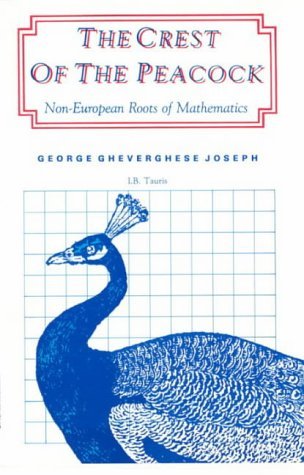

 |

|

The average rating for Calculus Concepts: An Informal Approach to the Mathematics of Change based on 2 reviews is 3 stars.
Review # 1 was written on 2011-10-17 00:00:00 Wayne Garber Wayne GarberThe problem of Eurocentrism is grossly overstated, particularly when it comes to histories of mathematics, but attacking it is an easy way to get people to think of you as sophisticated and brave, I guess. If Joseph set out, as he claims at various points, to show that non-Europeans contributed far more to modern mathematics than is commonly assumed, he failed. If he merely wanted to show that people outside of Europe and the Islamic world also had very sophisticated mathematical traditions, I'm not even sure he succeeded at that. A big problem seems to be that Joseph wasn't motivated to write this book by knowledge (either knowledge that he already had and wanted to share or just a love of the pursuit of knowledge), but spite. He covers a lot of ground with which I'm not incredibly familiar, but in the areas where I do have the ability to call him on bullshit, he shows himself more than willing to take liberties with the truth. A particularly egregious example (which I understand to be a bit of a hobby horse of his) is the Kerala school, which he doesn't just credit with independently discovering some clever concepts in proto-calculus and infinite series (which is probably already too generous; there are good reasons to believe they got quite a lot of help from Islamic scholars), but with actually being responsible for all of the accomplishments of Newton and Leibniz a few decades later, who he claims would have had access to the work of the Kerala school through Jesuit missionaries—something for which there is absolutely no evidence, and which no credible historian believes. Kerala, incidentally, is also Joseph's birthplace. Not that I'm suggesting bias or anything. This crap is typical of the entire book, though; when facts disagree with you, just appeal to a ``sophisticated understanding'' of those facts, or manufacture them outright. Add a good quantity of condescending racism aimed at most the people you claim to be defending (Egyptians, Mesoamericans, the Chinese), and voilà! you have a book for which you can apparently charge €27. The orthodoxy it purports to challenge is a tired straw man, and Joseph does nothing to refute the stereotype of Indian historical revisionaries as jealous obscurantists and petty cultural relativists. |
Review # 2 was written on 2015-02-12 00:00:00 Samuel Rondeau Samuel RondeauI've had this book for years. I flipped through it once in awhile and kept it around because I was interested in the multiple histories of math origins. To counter another review here, the author does not propose a thesis of the European inheritance of math from elsewhere nor does he glorify Indian mathematicians. He suggests there may be some paths of that nature but they are clearly loose hypotheses. Mostly he focuses on math and eventually we get to the real inheritance of our dominant decimal system. What worked the best for me were the alternating passages on history embedded with the somewhat clear breakdown, usually side by side with contemporary algebra, of some ancient method of performing a calculation. These were very interesting for me to work out. I expect to revisit some of the math in the book here and there to work through more of the problems he invites the reader to try. This is a very even-handed book. Where the author does not have enough time to go deeper into a subject, he offers up other avenues in the text. I will be taking him up on that offer. |
CAN'T FIND WHAT YOU'RE LOOKING FOR? CLICK HERE!!!